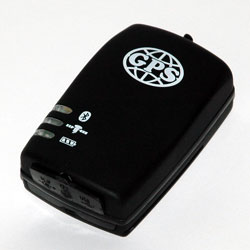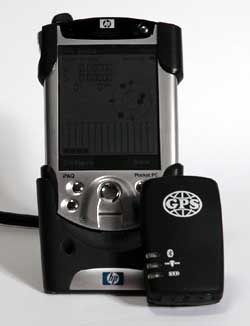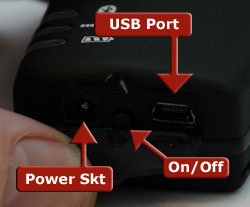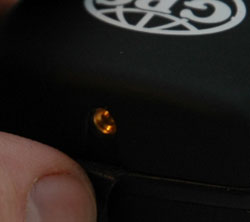|
|
 |
 |
 |
 |
| Daisy Technology Bluetooth GPS review |
10th December 2004 |
|
Review by Mike Barrett

Daisy Technology are an electronics manufacturer based in Sophia, Bulgaria. We met them at the CeBIT exhibition in Hannover this year where they were showing a prototype Bluetooth GPS receiver alongside their established GPS tracking systems.
Daisy have now productised the BT GPS and have sent us a sample for review. Daisy claim to have perfected a low power GPS with built-in power management which can last for 10 hours on a single charge. Does it achieve this? Read on to find out...
|
|
| Overview |
The Daisy BT GPS receiver is based on the ANTARIS GPS module, which is something I had not been aware of. This appears to be a chipset produced by a San Jose company called Amtel.
It offers exceptional power management, allowing the GPS to turn off when there is no connection, and also optimises the useage of the internal battery.
The receiver supports not only a Bluetooth wireless connection, but will also allow you to connect to a laptop via USB.
The receiver supports SBAS so should benefit from WAAS/EGNOS differential GPS position corrections bringing the accuracy of the reported position to within 2 metres.
The unit comes with a non-user replaceable battery, which at 1000 mAh has more capacity than a lot of PDAs.
|
 |
What's in the box
The review sample that Daisy provided us came with: The GPS receiver, a Power Supply (230 volts only with a continental adapter), a USB cable, a clip to mount the GPS and a CD containing instructions and drivers.
|
Manufacturers Specifications
GPS receiver
• 16 channel, L1 frequency, C/A code
• Positioning accuracy - 3 m CEP
• Start-up Times:
- Hot start - 3.5 sec
- Warm start - 33 sec
- Cold start - 41.5 sec
• Operational Limits COCOM restrictions apply
• Power Consumption - typical 160 mW
• Built-in ceramic patch antenna
• External active antenna (optional)
• Antenna supervisor with short-circuit
protection
GENERAL
• Rechargeable Li-Ion battery - 1000 mAh
• Autonomous operating time - min 10h
• Charge time (while tracking):
- DC charger - max 4h
- USB - max 10h
• Operating temperature range: -10°C ? +60°C
• Dimensions (W x L x H): 45 x 70 x 25 mm
• Weight: 0,08 kg
USB 1.1 and 2.0 compatible interface
• Power Consumption max 200 mA
• Data rate 300 - 3M Baud
• Virtual COM port drivers for:
- Windows 98/98SE/2000/ME/XP
- MAC OS-8/9/X
- Linux 2.40 and greater
Bluetooth
• Serial port profile
• Password protected pairing
• Operating range 10 m
|
 |
Compatibility
I tested the GPS with a number of software applications from TomTom to Memory-Map, and using most of the GPS software utilities I commonly run and the GPS worked fine with all of them.
|
The review
The Daisy GPS receiver is a medium sized GPS that fits snuggly into your hand when you are holding it. There are three indicator lights showing the status of the GPS: Bluetooth; Satellite Fix and Power. The base of the receiver has a rubberised flap which protects the power input, the on/off button and the USB connector.
When you first power the GPS on the device needs to be paired with the PDA. This is somewhat different to most GPS devices in that the receiver needs to be placed into pairing mode. To do this the on/off button needs to be pressed for between 7 and 10 seconds. When in pairing mode the Bluetooth and Power LEDs flash alternately. The GPS will then be discoverable and can be paired with the PDA. The key code for this GPS is '0000'. |
 |
In use the GPS is not as sensitive as some of the GPS devices I have used. This was not a problem in the areas where I used it, with one exception where I was unable to get a fix for over 15 minutes.
If you have a car with a coated windscreen, or have general signal problems then there is a socket at the top of the GPS where you can plug in an external antenna. This should improve the performance in these situations. You can of course place the GPS in the back of the car to make sure that it is getting a good clear view of the satellites.
How many times have I been using a bluetooth GPS in the car and when I have got to my destination I have just grabbed the PDA and left the GPS to flatten it's battery? Well this will not happen with the Daisy BT GPS. When the Bluetooth connection is broken the GPS receiver will automatically switch off. |
 |
Now that is what I call smart technology. It is almost Mike proof!
Well not quite. During the testing and evaluation of the GPS I found that I had managed to get a completely flat battery (from useage doing power tests) but I had misplaced the supplied charger. Not a problem I thought. Wrong!
The GPS does not use a standard iPAQ style power connector. I thought for a while that I was in serious trouble having a GPS that I couldnt recharge. Not so there is another way to charge the receiver: just plug in the USB cable and the receiver will trickle charge. It will take much longer then the mains charger, but it will work. I then got in touch with Daisy, who told me that the GPS is designed to br recharged by the Standard Nokia rechargers, of which I have many. I did later find the original charger.
In use I was getting between 9 and 10.75 hours from a single charge, with the average being just under 10 hours.
As I mentioned above the GPS has a USB port. This allows it to be connected to a laptop computer, where either Bluetooth is not available, or it is not convenient to use it. The CD provides some Virtual Serial drivers for the GPS enabling you to use it with PC applications that are GPS aware.
|
Issues and Problems
Whilst I was testing I had a few problems with GPS signal strength and fix times. These were not sufficient to cause significant problems. The receiver did seem to fix about 2 satellites less than other similar GPS devices.
As mentioned above the GPS does not use the standard iPAQ power connector, this made it a little awkward for me whilst traveling as I needed to remember to take 2 power supplies with me to recharge both devices overnight.
|
|
Conclusions
The Daisy BT GPS is a well designed and constructed GPS. My only doubts are the decision to move away from the industry standard iPAQ style power connectors, and the lower signal sensitivity. That said it has a massive battery which provides power far beyond that of the iPAQ PDAs that I used it with. |
Pros
- Large capacity battery
- Solid sound design can withstand mistreatment.
- Connectivity via BT and USB
|
Cons
- Non-standard power supply
- Not the most sensitive receiver
|
|
|
|
 |
 |
 |
 |
|
|